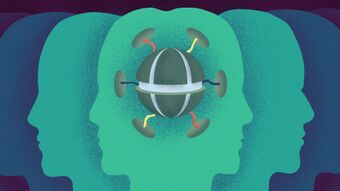The only Problem with “Transhumanism” is Jesus
Technology, Robotics, and AI
I’ve just done a recording for Premier Radio on “transhumanism” – with Micah Redding, a software designer from the United States who has started something called the “Christian Transhumanist Association.”
Can you be a “Christian Transhumanist”?
Russell Moore, the leader of the U.S. Southern Baptist Convention group that focuses on ethics and society issues, plainly thinks not. He tweeted that it’s like being a “carnivorous vegan”!
Let’s take a step back and ask what this is really all about.
First, what does “transhumanism” mean? It’s a pretty muddy concept, to be honest. Back 15-20 years ago I got interested in these discussions and began going to conferences in the United States that were run either by “transhumanists” or people sympathetic to them. One time I was invited to make a speech! Since the conference was hosted by the prestigious Stanford Law School I took the invitation seriously and went along. I was one of two “humans” on the programme.
The core idea of “transhumanism” is that the various technologies that give us humans extra power – that “enhance” our human capacities – are taking us beyond being “merely” human. And that it’s great! If it carries on this way, soon we won’t need to be human at all, they say.
Obviously, we now have amazing technologies that give us what look like super-human powers. But that’s not exactly new.
Ever used a wheelbarrow? There’s no way an unaided human could do what a wheelbarrow lets you do. Or a spade. Or an adze. Or….
From the start, technology has given us a leg up. OK, brain implants that let us operate equipment by thinking are different (and we already have them). But not entirely different. So, point one, a bucket of cold water on the idea that 21st century tech is uniquely “super-human” tech. All tech gives us humans new powers. Let’s keep things in perspective.
What transhumanists seem to be saying is: Let’s welcome these new technologies – and (this is what really matters) let’s use them to get beyond just being “human.” Because “human” is second-rate.
Maybe the most memorable statement of this position was from Kevin Warwick, Professor of Cybernetics at the University of Reading. In the February 2000 issue of the tech magazine Wired he said: “I was born human. But this was an accident of fate - a condition merely of time and place. I believe it's something we have the power to change.”
Some transhumanists talk about the “post-human” state. The “transhuman” is transitional. We will then shift beyond the biology of Homo sapiens – initially merging with machines to become “cyborgs,” then uploading our brains into the digital world so we can live on forever without biological ageing.
This may look a bit crazy (I think it is!), but I admire the way these people ask visionary questions and peer into the distant future. That’s why I’ve got to know some of their thinkers and leaders, and appreciated the opportunity to share ideas.
I certainly think that these new technologies – and the technologies that come after them, and those that come after that – will have a vast impact on how we live. But what will we do with them? What do we want to do? Can we shape how we use them to do good?
Back in 2015 I was invited to speak at a really interesting conference in Portugal. The topic: what the world will be like in 100 years’ time. This one wasn’t run by transhumanists, but by a major research foundation.
We certainly need to have that conversation, because thinking about the distant future is key to understanding the choices we need to make now as we prepare. The invitation letter to the conference, from former Brazilian President Cardoso, stated that a child born today may well be alive in 100 years. We can’t be sure, but the current projection is that there’s a 50-50 chance.
One hundred years seems a long time, but I think we need to be prepared for a far more distant future for the human race. Plainly we don’t know God’s plans for us and our planet, But for that reason we need to reflect on the possibility of not just 100 years, or a million years, of future for the human race, but maybe a billion years. Don’t think too hard or it might give you a headache! But Christians need to be among the visionaries thinking long-long-long-term.
That’s why I was happy to speak to the transhumanist conference at Stanford 15 years back, and happy to sit down the other day with Micah at Premier.
But just what are we Christians meant to think about all this?
First, plainly, it’s God’s world and He’s put us humans here to run it for Him.
Genesis chapter 1 never gets old!
Here’s the “mandate” in Genesis 1:28. It’s very clear. “Fill the earth and subdue it. Rule over the fish in the sea and the birds in the sky and over every living creature that moves on the ground” (NIV). All this tech – from the wheelbarrow to nanobots and AIs – are part of that same picture. God has given us the tech; and we need to work out what to do with it – as His stewards.
Second, one verse earlier than that very clear statement about our responsibility, He told us the second most important fact in the entire universe: “So God created mankind in his own image, in the image of God he created them, male and female he created them.”
We humans are as special as can be! We’re to manage God’s world, but to be “human” is to be made like God, as much like God as could be for creatures who live in the confines of space and time.
If that’s the second most important fact, what’s the first? You’ve probably guessed. Having made us to like Him, God then decided to become one of us. Born as a baby, God Himself took the form of a member of our species.
You see where this is going.
Whatever new powers and opportunities technology provides, there’s no way to move up higher than being human! You can certainly become a cyborg one day, if you like. And – who knows – maybe you’ll be able to upload your brain (I hope onto a software platform more reliable than the ones we have now!). But don’t deceive yourself into thinking this is a step up.
I mentioned the conference in Portugal on the world in 100 years. My topic? The Human Question in 100 years (you can see the video – link below).
I told the distinguished audience (which included at least two Nobel prize-winners and the Queen of Spain!) to think about the conference they might hold in 2115. We had shared a lovely dinner the evening before – 150 guests in the library of a medieval monastery, all lit by candles. I said I hoped that in 100 years’ time we would still wish to fly in from all over the place, and spend actual physical time together, and share a wonderful meal in such a delightful setting. Because that would be a profoundly human thing to do. Not meet in Virtual Reality, or send our bots to meet for us, or whatever the 2115 version of a Skype call will be.
Let’s welcome these new technologies, but keep exploring what it means to be human – like Jesus.
Find out more
Listen to my debate with Micah Redding on the Unbelievable? Show, chaired by Justin Brierley.
Buy a copy of my The Robots are Coming: Us, Them and God for just £4.99 from the CARE shop
Micah Redding’s website: www.christiantranshumanism.org
My speech on The Human Question in 100 years: https://www.youtube.com/watch?v=zXasXOGNqII





Share story
The only Problem with “Transhumanism” is Jesus